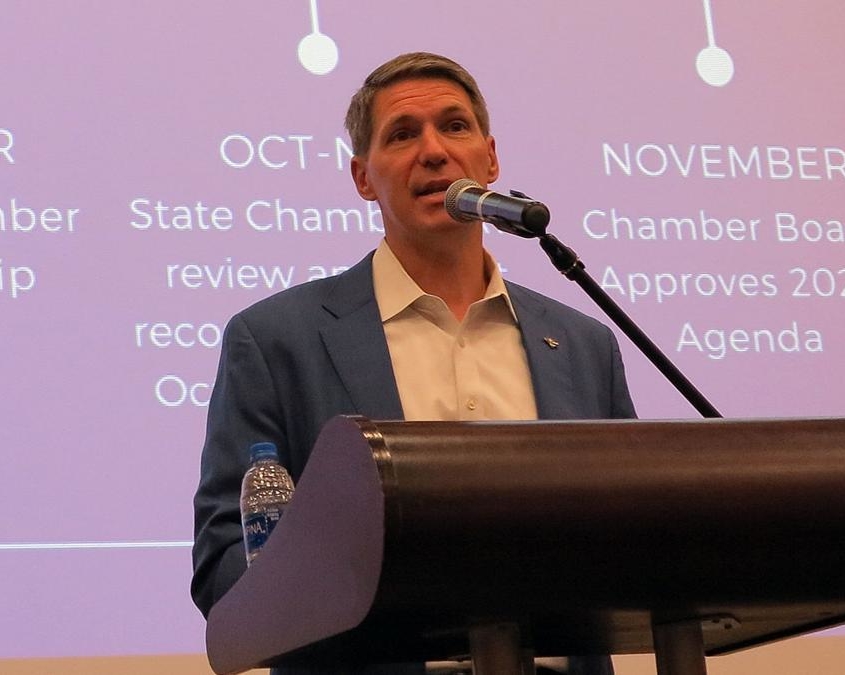Grassroots Tour: SC Chamber’s Top Issues Include Tax Reform and Workforce Development
by Ardie Arvidson
The annual South Carolina Chamber of Commerce Grassroots Tour came Monday to Florence, bringing community leaders together to provide an overview of 2019’s state legislative accomplishments and to seek feedback on issues local businesses and manufactures think are important and need addressing in the coming legislative session.
The Greater Florence and Greater Hartsville chambers of commerce partnered to bring the event to the Southeastern Institute of Manufacturing and Technology Center on the Florence-Darlington Technical College campus.
“I’m here to get your feedback,” said Ted Pitts, the South Carolina Chamber of Commerce president and chief executive.
Each year, the South Carolina Chamber of Commerce and regional chambers of commerce in South Carolina come together for the Grassroots meeting. Pitts said they will be conducting 23 meetings around the state. The tour gives businesses from all areas of the state, large and small, the opportunity to weigh in on issues they are facing and would like addressed in the upcoming legislative session.
The feedback received collectively from those attending the meetings will help shape the state chamber’s 2020 Competitiveness Agenda and set chamber priorities for the next legislative session.
Pitts said the Competitiveness Agenda is the “South Carolina business community’s top legislative priorities that address issues generally affecting all types of business in all parts of the state.”
“This is a perfect opportunity for our area industry and manufacturing leaders, along with regional and local business representatives, to offer valuable input for our state representatives to hear and our state chamber to incorporate in their 2020 agenda,” Mike Miller, the president of the Greater Florence Chamber, said in a news release prior to the meeting.
Looking back at the Competitiveness Agenda, Pitts said comprehensive tax reform and workforce development were two top priorities.
Pitts said South Carolina is facing an aging population. He said 23 percent of the South Carolina workforce is 55 years old or older, and the number was only 11 percent in 1998. He said the average age in South Carolina is 40 years old.
Pitts said tax reform is a complicated issue.
“We need to change the tax code,” he said.
Pitt said it is not an easy task but is something that needs to be done for the state.
The South Carolina property tax system is one of extremes – very low homestead rates and very high industrial rates, he said. South Carolina ranks 13th highest for industrial property taxes, Pitts said.
Pitts said the Business License Tax Reform (H.4431) provides uniformity, changes tax base from gross revenue to net income, does not stop a local government’s ability to raise revenue and does not remove any local agreements.
On the issue of business license tax reform, Florence Mayor Stephen Wukela had concerns and spoke up during the question and answers session. He said Florence runs a tight ship, and services would have to be cut if that revenue couldn’t be counted on.
Pitts said in many areas of the state, housing for working people is an issue of concern. In the interactive polling, the group agreed there is not enough “workforce housing” in this area also.
Another topic Pitts said that is concerning people in South Carolina is the lack of internet access in rural areas of the state.
He said more than half a million South Carolinians lack access to reliable broadband internet. He said H3780 would create a state fund for rural internet projects.
Pitts said the education omnibus bill addresses many of the key concerns of education reform in South Carolina, including teacher pay, school consolidation and strong measures to improve chronically underperforming school districts and providing K-4 reading programs.
One question asked of the group during interactive polling was if they support strong measures to hold chronically underperforming schools accountable. Ninety-two percent of those polled said yes. Six percent said no, and 1% was not sure.
Approximately 140 people attended the breakfast made possible by SiMT and Sonoco.
“I came as part of the chamber,” said Sherry Grant, the Florence Work Training Center manager for S.C. Vocational Rehabilitation. “I represent the South Carolina Vocational Rehab department. We like to connect with our employers in the area and find out what their needs are in this area. It is also a networking opportunity.”
Roger Schrum, the corporate vice president of investor relations and corporate affairs with Sonoco Products Company, introduced the program’s priorities. Bobby McGee gave the invocation. Miller welcomed guess, and Murphy Monk, the president of the Greater Hartsville Chamber of Commerce, adjourned the meeting.
To read the full article on SC Now, click here.










